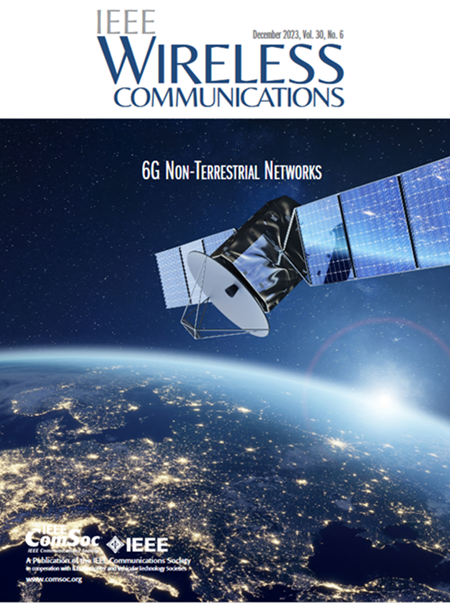When UAV Meets IRS: Expanding Air-Ground Networks via Passive Reflection
IF 10.9
1区 计算机科学
Q1 COMPUTER SCIENCE, HARDWARE & ARCHITECTURE
引用次数: 133
Abstract
Thanks to their flexibility and mobility, unmanned aerial vehicles (UAVs) have been widely applied in wireless networks. However, UAV communications may suffer from blockage and eavesdropping in practical scenarios due to the complex environment. Taking the recent advances in intelligent reflecting surface (IRS) to reconfigure the propagation environments, in this article, we employ IRS to enhance the performance of UAV-aided air-ground networks. First, we overview the combination of UAV and IRS, by introducing the diverse applications of IRS and the appealing advantages of UAV, and highlighting the benefits of combining them. Then, we investigate two case studies where the UAV trajectory, the transmit beamforming and the IRS passive beamforming are jointly optimized. In the first case study, by equipping the IRS on a UAV, the average achievable rate of the relaying network is maximized. In the second one, the IRS is deployed to assist the UAV-ground communication while combating the adversarial eavesdropper. Simulation results are provided to demonstrate the performance enhancement resulting from combining UAV and IRS in air-ground networks. Finally, we shed light on some challenging issues to be resolved for practical implementations in this direction.当无人机遇到IRS:通过被动反射扩展空地网络
由于其灵活性和机动性,无人机在无线网络中得到了广泛的应用。然而,由于环境复杂,在实际场景中,无人机通信可能会受到干扰和窃听。本文结合智能反射面(IRS)技术的最新进展,重新配置传播环境,利用IRS技术来提高无人机辅助地空网络的性能。首先,我们概述了无人机与IRS的结合,介绍了IRS的多种应用以及无人机的诱人优势,并强调了两者结合的好处。在此基础上,研究了无人机弹道、发射波束形成和IRS被动波束形成联合优化的两种情况。在第一个案例研究中,通过在无人机上装备IRS,使中继网络的平均可达速率最大化。在第二种情况下,IRS被部署以协助无人机地面通信,同时打击对抗性窃听者。仿真结果表明,在地空网络中,无人机与IRS相结合可以提高系统的性能。最后,我们阐明了在这个方向的实际实现中需要解决的一些具有挑战性的问题。
本文章由计算机程序翻译,如有差异,请以英文原文为准。
求助全文
约1分钟内获得全文
求助全文
来源期刊

IEEE Wireless Communications
工程技术-电信学
CiteScore
24.20
自引率
1.60%
发文量
183
审稿时长
6-12 weeks
期刊介绍:
IEEE Wireless Communications is tailored for professionals within the communications and networking communities. It addresses technical and policy issues associated with personalized, location-independent communications across various media and protocol layers. Encompassing both wired and wireless communications, the magazine explores the intersection of computing, the mobility of individuals, communicating devices, and personalized services.
Every issue of this interdisciplinary publication presents high-quality articles delving into the revolutionary technological advances in personal, location-independent communications, and computing. IEEE Wireless Communications provides an insightful platform for individuals engaged in these dynamic fields, offering in-depth coverage of significant developments in the realm of communication technology.
 求助内容:
求助内容: 应助结果提醒方式:
应助结果提醒方式:


